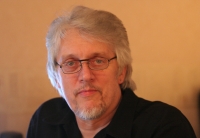I've just read your blog from cover to cover, and to tell you the truth I can see that you're really into it but nowadays it's really hard to "save" folk-music. It's such an interesting subject and there are so many issues - but I think that it's all about the young generation!!! All the issues depend on them. From the very beginning - I think that the problem is situated in the past. I mean it's a big folk treasure as well as a disaster, that this kind of music possesses historical and traditional sources. If you try to accost some of the young people on the street and ask them "what do you think about folk music?", then you'll hear: traditional, boring, old-fashioned... It's all about stereotypes. Everybody associates folk music with those descriptions.
It's always been the case that what our parents or grandparents like is not interesting to us. It's the nature of growing up - if there is something what the young people associate with parents, they don’t like it.
The next issue is incomprehension. It's very similar with classical music - young people might like it but not for a long time. After a few compositions they'll say BORING - why? Because they don’t understand this music, they don’t know how to listen to it, how "to see" the art in it, they don’t know anything about it. There are some talented, young people who love this music but generally most of the youth don’t like it because of their incomprehension. And the same problem is with folk music - after few songs or compositions they start to feel bored, because they can't pick up on the art of this music.
There are some countries with old folk traditions like my country (Poland), and all young Poles don’t like this kind of music only because of the "age" of this music and tradition of course. I mean we respect our traditions but for us this music can't be popular, commonplace (daily music) because we have this music at every traditional celebration or wedding and we associate this music with traditions only. But there is something about this music - folk music - it's really weird that young people say 'boring, old fashion and traditional' so it means 'not for them', but at the same time those kind of big concerts like Woodstock (where there are always 3 folk bands at least)then you can see how amazing, with power, happiness and natural fascination they are dancing, singing, screaming and having a really good time - even better than to their own, favorite kinds of music. So where is the power of folk music???
In the end I just wanted to say that for me the only way to "save" and make this kind of music more popular is just try to mix it with different kinds of music. In my experience those experiments are a perfect solution. Personally I’m really interested in folk with rock music - this mix for me is just perfect. I think that more experimental music will be more liked by youth, or mix folk with electronic music - I mean I never heard this composition but it sounds interesting. I know that if you try to mix folk with different kinds of music you'll lose part of the natural folk innocence but if you wanted to save all the nature of folk music you'll be still on the same level with it like now, that there is a small group of people who are really interested to it. Nowadays the young generation has the strongest voice in the music sector, so I think that if you convince them, then you'll achieve success.
I asked about the impact of traditional folk music in Poland. Dagmara (sorry I don't know if the writer is a he or a she) replied:
...you can find Polish folk tradition in every single part of this country. It's a huge sphere of art, books, stories, celebrations, painting and music of course! Poland is a rich source of folk tradition, and to be honest with you 'one life is not enough' to do a research about it. In Poland we call it INDEPENDENT CULTURE. We have plenty of folk festivals every year, concerts, promotions of folk music, sponsors, editions, periodical newspapers, schools etc. (like I said before Poland is a huge folk market). The Polish Ministry of education try to turn young people's interest in folk traditions and mobilize them - that is all those festival are every year and it's a really big performance.
Dagmara - thanks. Hope you keep reading the blog and commenting! I wonder whether we should expect the British Department for Education to be so pro-active in promoting folk?
Filed under:
Poland folk tradition folk image music promotion


